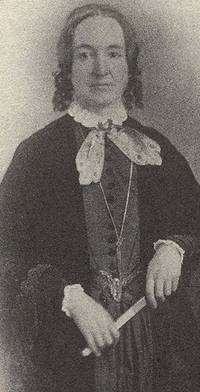Elizabeth Packard
Elizabeth Packard (1816–1897) was an American advocate for the rights of women and the mentally ill, who gained fame after being involuntarily committed to an insane asylum by her husband. Her case led to significant reforms in the treatment of women and the mentally ill, as well as changes in the laws governing involuntary commitment in the United States.
Early Life[edit | edit source]
Elizabeth Parsons Ware was born on December 28, 1816, in Ware, Massachusetts. She was well-educated for a woman of her time, attending the Amherst Female Seminary and later marrying Theophilus Packard, a Calvinist minister, in 1839. The couple had six children together. Elizabeth's troubles began in earnest when she started to express religious views that differed from her husband's and the local community's.
Involuntary Commitment[edit | edit source]
In 1860, without her consent, Elizabeth was committed to the Illinois State Hospital for the Insane in Jacksonville, Illinois, by her husband. Theophilus Packard justified his actions by claiming that Elizabeth was insane, a claim based largely on her religious liberalism and increasingly outspoken views on women's rights, which clashed with his own conservative beliefs.
During her three-year confinement, Elizabeth was denied the right to a trial to prove her sanity. Despite this, she managed to smuggle out letters to her friends, detailing her unjust treatment. These letters helped to build public support for her cause.
Legal Battles and Reforms[edit | edit source]
Elizabeth was finally released in 1863 after a jury found her to be sane. Following her release, she became a vocal advocate for the rights of married women and the mentally ill. She lobbied for laws that would protect these groups from unjust confinement and abuse. Her efforts led to significant legal reforms, including the enactment of a law in Illinois that required a public hearing before a person could be committed to an asylum, granting them the right to a defense.
Elizabeth also fought for married women's property rights and for reforms in the treatment of the mentally ill. She published several books and pamphlets on these subjects, including The Great Disclosure and Married Women's Liabilities.
Legacy[edit | edit source]
Elizabeth Packard's advocacy work had a lasting impact on American society. Her efforts helped to improve the legal rights and treatment of both women and the mentally ill. Today, she is remembered as a pioneering figure in the fight for civil rights and social justice.
See Also[edit | edit source]
Search WikiMD
Ad.Tired of being Overweight? Try W8MD's physician weight loss program.
Semaglutide (Ozempic / Wegovy and Tirzepatide (Mounjaro / Zepbound) available.
Advertise on WikiMD
|
WikiMD's Wellness Encyclopedia |
| Let Food Be Thy Medicine Medicine Thy Food - Hippocrates |
Translate this page: - East Asian
中文,
日本,
한국어,
South Asian
हिन्दी,
தமிழ்,
తెలుగు,
Urdu,
ಕನ್ನಡ,
Southeast Asian
Indonesian,
Vietnamese,
Thai,
မြန်မာဘာသာ,
বাংলা
European
español,
Deutsch,
français,
Greek,
português do Brasil,
polski,
română,
русский,
Nederlands,
norsk,
svenska,
suomi,
Italian
Middle Eastern & African
عربى,
Turkish,
Persian,
Hebrew,
Afrikaans,
isiZulu,
Kiswahili,
Other
Bulgarian,
Hungarian,
Czech,
Swedish,
മലയാളം,
मराठी,
ਪੰਜਾਬੀ,
ગુજરાતી,
Portuguese,
Ukrainian
Medical Disclaimer: WikiMD is not a substitute for professional medical advice. The information on WikiMD is provided as an information resource only, may be incorrect, outdated or misleading, and is not to be used or relied on for any diagnostic or treatment purposes. Please consult your health care provider before making any healthcare decisions or for guidance about a specific medical condition. WikiMD expressly disclaims responsibility, and shall have no liability, for any damages, loss, injury, or liability whatsoever suffered as a result of your reliance on the information contained in this site. By visiting this site you agree to the foregoing terms and conditions, which may from time to time be changed or supplemented by WikiMD. If you do not agree to the foregoing terms and conditions, you should not enter or use this site. See full disclaimer.
Credits:Most images are courtesy of Wikimedia commons, and templates, categories Wikipedia, licensed under CC BY SA or similar.
Contributors: Prab R. Tumpati, MD

